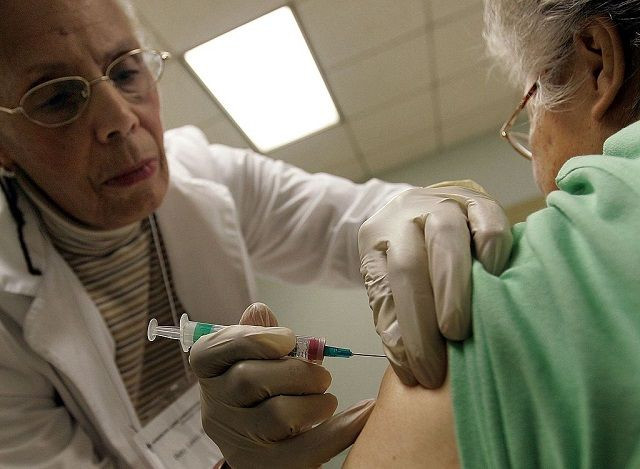Flu Shot 2016 Update: High-Dose Influenza Vaccine Provides Better Outcomes Than Standard Shot

The stronger the flu shot, the better off our seniors’ health — and our wallets — will be, suggests new research published in Human Vaccines & Immunotherapeutics.
Researchers reexamined data from an earlier randomized clinical trial of 32,000 participants over the age of 65 given either a regular or high-dose inactivated influenza vaccine (IIV-HD). The original study involved patients in both the United States and Canada, but the researchers specifically calculated any potential health savings between the two groups in Canadian dollars. All told, they found IIV-HD patients incurred $47 ($35 USD) less in direct health costs and $60 ($45 USD) in societal costs per person throughout the flu season than did patients given the standard shot, even accounting for the vaccine’s likely increased price.
The authors noted that the “majority of the savings generated by IIV-HD were driven by reductions in cardiorespiratory hospitalizations plausibly related to influenza.”
In addition to healthcare savings, the IIV-HD patients experienced a small boost in the number of estimated quality-adjusted life-years (QALYs), which measures the amount of time spent in perfect health over a year’s time, compared to the standard shot group. This again was largely chalked up to reduced hospitalizations, which are much more common in the elderly stricken by flu.
“The heightened susceptibility of seniors to complications is due in large part to natural and progressive weakening of the immune system over time,” explained senior author Dr. Ayman Chit, a researcher at Sanofi Pasteur, the pharmaceutical company that developed the vaccine, in a statement. “This phenomenon, known as immunosenescence, renders seniors less responsive to standard dose influenza vaccine. High-dose IIV, with 60 μg hemagglutinin per viral strain, was designed to improve efficacy by increasing vaccine antigen content.”
The original trial found that the high-dose shot was 24 percent more effective at preventing flu than the standard dose.
Impressive as the savings might be for Canadian citizens, the savings are even more drastic stateside: An earlier study by Chit’s team found that the vaccine could save $128 and $80 dollars per person in Medicare and societal costs, respectively. The discrepancy was due to overall higher hospital bills in the U.S., the authors noted. Though the vaccine has not been launched in Canada yet, the Food and Drug Administration approved it (branded Fluzone High Dose) in 2009 for seniors.
The academic journal Human Vaccines & Immunotherapeutics is a publication of the T aylor & Francis Group.
Source: Becker D, Chit A, DiazGranados C, et al. High-Dose Inactivated Influenza Vaccine is Associated with Cost Savings and Better Outcomes Compared to Standard-Dose Inactivated Influenza Vaccine in Canadian Seniors. Human Vaccines & Immunotherapeutics. 2016.
Published by Medicaldaily.com



























